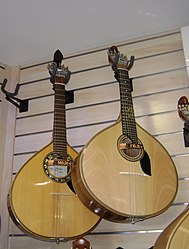Portuguese guitar

left: Coimbra guitar; right: Lisbon guitar.
|
|
| String instrument | |
|---|---|
| Classification | String instrument |
| Related instruments | |
| Guitar - Cittern | |
The Portuguese guitar or Portuguese guitarra (Portuguese: guitarra portuguesa, pronounced: [ɡiˈtaʁɐ puɾtuˈɣezɐ]) is a plucked string instrument with twelve steel strings, strung in six courses of two strings. It is one of the few musical instruments that still uses Preston tuners. It is most notably associated with the musical genre known as "fado".
The Portuguese guitar now known has undergone considerable technical modification in the last century (dimensions, mechanical tuning system, etc.) although it has kept the same number of courses, the string tuning and the finger technique characteristic of this type of instrument.
There is evidence of its use in Portugal since the thirteenth century (cítole) amongst troubadour and minstrel circles and in the Renaissance period, although initially it was restricted to noblemen in court circles. Later it became popular and references have been found to citterns being played in the theater, in taverns and barbershops in the seventeenth and eighteenth century in particular.
In 1582, Friar Phillipe de Caverell visited Lisbon and described its customs; he mentions the Portuguese people’s love for the cittern and other musical instruments. In 1649 was published the catalogue of the Royal Music Library of King John IV of Portugal containing the best known books of cittern music from foreign composers of the sixteenth and seventeenth centuries, in which the complexity and technical difficulty of the pieces allow us to believe that there had been highly skilled players in Portugal.
The angel playing the cittern (c.1680), a sculpture of large dimensions in the Alcobaça Monastery, depicts in detail the direct ancestor of the Portuguese guitar. In the first half of the eighteenth century, Ribeiro Sanches (1699–1783) had cittern lessons in the town of Guarda, Portugal as he mentions in a letter from St. Petersburg in 1735.
...
Wikipedia
